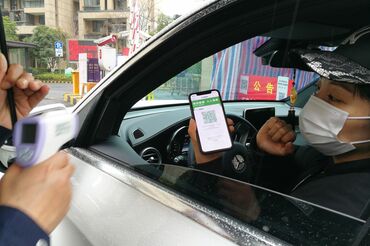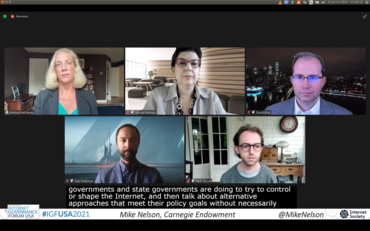Immune response
 The slight reopening of international travel - at least inbound to the UK - is reupping discussions of vaccination passports, which we last discussed here three months ago. In many ways, the discussion recapitulates not only the ID card battles of 2006-2010 but also last year's concerns about contact tracing apps.
The slight reopening of international travel - at least inbound to the UK - is reupping discussions of vaccination passports, which we last discussed here three months ago. In many ways, the discussion recapitulates not only the ID card battles of 2006-2010 but also last year's concerns about contact tracing apps.
We revisit so soon for two reasons. First, the UK government has been sending out conflicting messages for the last month or more. Vaccination passports may - or may not - be required for university attendance and residence; they may be required for domestic venues - and football games! - in September. One minister - foreign secretary Dominic Raab - says the purpose would be to entice young people to get vaccinated, an approach that apparently worked in France, where proposing to require vaccination passports in order to visit cafes caused a Eiffel Tower-shaped spike in people presenting for shots. Others seem to think that certificates of either vaccination or negative tests will entice people to go out more and spend money. Or maybe the UK won't do them at all; if enough people are vaccinated why would we need proof of any one individual's status? Little has been said about whatever the government may have learned from the test events that were supposed to show if it was safe to resume mass entertainment gatherings.
Second, a panel discussion last month hosted by Allyson Pollack raised some new points. Many of us have thought of covids passport for international travel as roughly equivalent to proof of vaccination for yellow fever. However, Linet Taylor argues that the only time someone in a high-income country needs one is if they're visiting a country where the disease is endemic. By contrast, every country has covid, and large numbers - children, especially - either can't access or do not qualify for covid vaccinations. The problems that disparity caused for families led Israel to rethink its Green Pass, which expired in June and was not renewed. Therefore, Taylor said, it's more relevant to think about lowering the prevalence of the disease than to try to distinguish between vaccinated and unvaccinated. The chief result of requiring vaccination passports for international travel, she said, will be to add extra barriers for those traveling from low-income countries to high-income countries and cement into place global health inequality and unequal access to vaccines. She concluded that giving the responsibility to technology companies merely shows we have "no plan to solve them any other way".
It also brings other risks. Michael Veale, and Seda F. Gürses explain why the computational infrastructure required to support online vaccination verification undercuts public health objectives. Ellen Ullman wrote about this in 1997: computer logic eliminates fuzzy human accommodations, and its affordances foster administrative change from help to surveillance and inclusion to exclusion. No one using the system - that is people going to pubs and concerts - will have any control over what it's doing.
Last year, Westerners were appalled at the passport-like controls China put in place. This year, New York state is offering the Excelsior Pass. Once you load the necessary details into the pass, a mobile phone app, scanning it gains you admission to a variety of venues. IBM, which built the system, is supposedly already investigating how it can be expanded.
As Veale pointed out, a real-time system to check vaccination certificates will also know everywhere each individual certificate hass been checked, adding inevitable intrusion far beyond the vaccinated-yes/no binary. Two stories this week bear Veale out. The first is the New York Times story that highlighted the privacy risks of QR codes that are proliferating in the name of covid safety. Again, the average individual has no way to tell what data is incorporated into the QR code or what's being saved.
The second story is the outing of Monsignor Jeffrey Burrill by The Pillar, a Medium newsletter that covers the Catholic Church. The Pillar says its writers legally obtained 24 months' worth of supposedly anonymized, aggregated app signal data. Out of that aggregated mass they used known locations Burrill frequents to pick out a phone ID with matching history, and used that to track the phone's use of the LGBTQ dating app Grindr and visits to gay nightclubs. Burrill resigned shortly after being informed of the story.
More important is the conclusion Bruce Schneier draws: location data cannot be successfully anonymized. So checking vaccination passports in fact means building the framework of a comprehensive tracking system, whether or not that's the intention..
Like contact tracing apps before them, vaccination passports are a mirage that seem to offer the prospect of living - in this case, to people who've been vaccinated against covid - as if the pandemic does not exist. Whether it "works" depends on what your goal is. If it's to create an airport-style fast track through everyday life, well, maybe. If it's to promote public health, then safety measures such as improved ventilation, moving events outdoors, masks, and so on are likely a better bet. If we've learned anything from the last year and a half, it should be that no one can successfully create an individual bubble in which they can pretend the pandemic is over even while it rages in the rest of the world,
Illustrations: China's Alipay Health Code in March, 2020 (press photo).
Wendy M. Grossman is the 2013 winner of the Enigma Award. Her Web site has an extensive archive of her books, articles, and music, and an archive of earlier columns in this series. Stories about the border wars between cyberspace and real life are posted occasionally during the week at the net.wars Pinboard - or follow on Twitter.


-thumb-370x277-1083.jpg)
